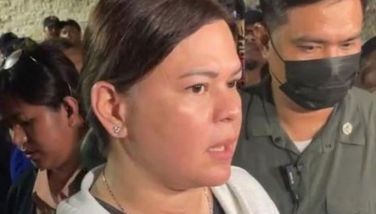Political dynasties reign in Philippines — study
MANILA, Philippines - Political dynasties continue to reign in the Philippine political landscape, especially in isolated and far-off provinces, despite anti-dynasty initiatives of civil society, a study by the Asian Institute of Management (AIM) Policy Center has found.
Ronaldo Mendoza, executive director of the AIM Policy Center and leader of a research team that looked into reigning political clans with a tight control of elective positions in local governments nationwide, said political dynasties continue to monopolize political power in many local governments like provinces, municipalities and cities nationwide, and categorized current reigning political clans as “fat†or “thin†dynasties.
Despite the Maguindanao massacre that was condemned here and abroad, the Ampatuan family continues to reign in Maguindanao, topping the list of the “fat†dynasties in the country.
Mendoza said “fat†dynasties are political families that have several members holding elective positions in a certain local government for three years.
A “thin†dynasty is a political clan that only has two members – like a father and son – swapping certain positions, as when a mayor-father, at the end of his maximum three terms, lets his son, who may also have reached his three-year term either as vice mayor, councilor, provincial governor or vice governor, running for each other’s position, he added.
A fat dynasty monopolizing power is an undesirable situation, he pointed out, as checks and balances among elected officials in a certain local government are difficult if they are all from one family.
In Maguindanao, the “fat†Ampatuan dynasty held eight out of the 37 mayoralty posts in the province’s 37 municipalities, Mendoza said.
Other provinces with a big number of fat dynasties include Apayao province, Dinagat Islands, Siquijor and Sulu.
Mendoza said in their study, which looked into dynasties that took and kept power in the 2007 and 2010 elections, there were more fat dynasties in the political landscape in the 2010 elections.
Mendoza presented the 2012 study results yesterday in a forum attended by academe and civil society that tackled the issue of political dynasties at the Discovery Suites in Ortigas Center, Pasig.
Dubbed “Building an Inclusive Democracy,†the forum featured the AIM Policy Center study led by Mendoza, as well as academics from the University of the Philippines - National College of Public Administration, De La Salle University, and Ateneo de Manila University who are among the most dedicated scholars on dynasties, politics, and elections in the country.
Mendoza, however, said the Philippines was not alone in having the problem of political dynasty.
“We’re not the only ones with this particular phenomenon,†he said. “Let’s not beat ourselves up because of it.â€
Mendoza said other Asia countries have recently seen dynasties, but thin ones, holding power, as he cited the case of Thailand where a sister of deposed Prime Minister Thaksin Shinawatra, Yingluck, was voted into the post; North Korea where a son of Kim Jong Il, Kim Jong Un, succeeded the strongman; Rahul Gandhi of the Gandhi political dynasty eyed to be a prime minister; South Korea where the first female elected president Park Geun-hye is a daughter of former president Park Chung-hee.
- Latest
- Trending



























